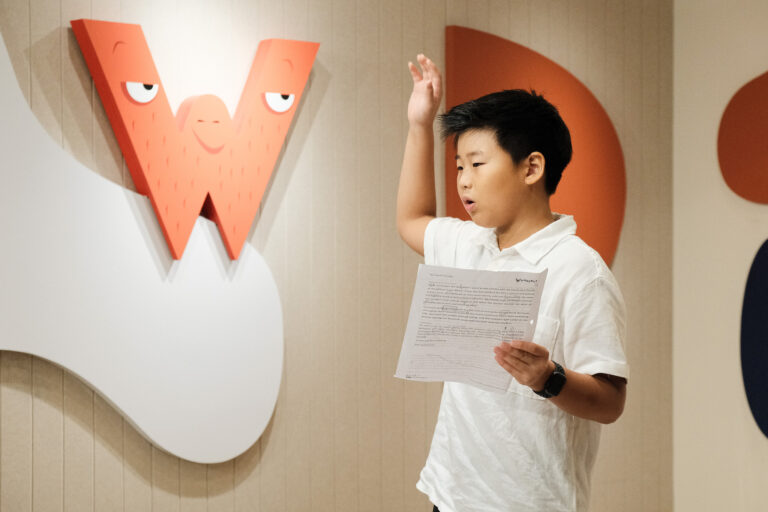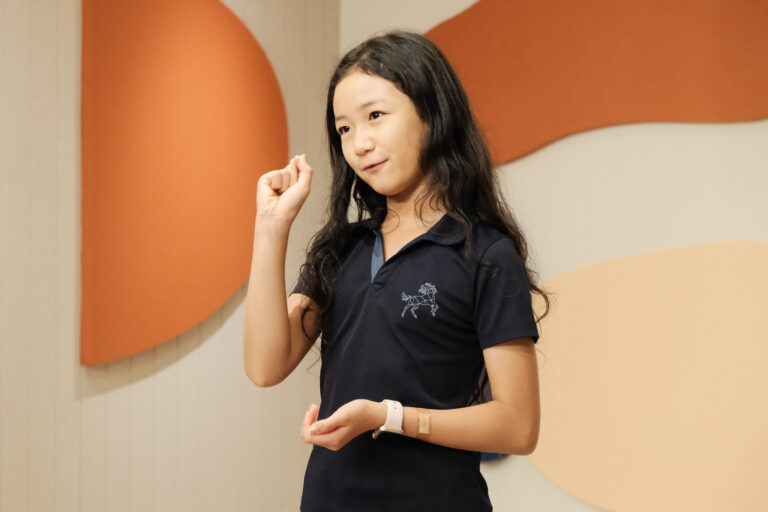
Are Some Children Just ‘Naturally’ Good at Public Speaking?

Public speaking in children is a captivating phenomenon that often leaves parents, teachers, and even the kids themselves wondering: are some youngsters simply born with the gift of the gab, or is the art of public speaking a skill that can be nurtured and developed over time?
Public speaking is often considered a daunting task for many adults, so naturally, the question remains. Furthermore, where English enrichment programmes and speech and drama classes for children thrive in Singapore, the question gains particular significance. In this article, we explore the tapestry of factors that contribute to the development of confident young speakers today.
The nature argument: Innate talents?

Are some kids just wired to excel in public speaking from the moment they utter their first words? While there may be children who seem to effortlessly command attention and articulate their thoughts with remarkable clarity, attributing it solely to nature might be an oversimplification.
Research suggests that certain personality traits, such as confidence and extroversion, may have a strong genetic component1. However, even the most naturally gifted speakers need to hone their skills through experience and practice. So, while nature might provide a foundation, it is not the sole determinant of public speaking proficiency. In fact, nurturing and cultivating these skills through various speech and drama activities can significantly contribute to boosting shy kids’ confidence.
The nurture perspective: Learning the art
On the flip side, the argument for nurture emphasises the impact of education, environment, and personal development on a child’s ability to speak persuasively in public. Exposure to supportive mentors, diverse experiences, and a positive learning environment can significantly contribute to the cultivation of effective communication skills.
Children are like sponges, absorbing skills and information from their surroundings. Encouraging them to express themselves, providing constructive feedback, and offering opportunities for public speaking can mould them into confident and articulate communicators.
The perfect blend: Practical tips for parents

Enrolling kids in a public speaking course often reveals that many lack an inherent, natural inclination towards eloquence or confidence in public speaking. However, this deficiency in “nature” can be significantly mitigated and even overcome through the power of “nurture.” Education, practice, and exposure play pivotal roles in nurturing these skills. Public speaking courses provide a structured environment for children to learn the fundamentals, gradually building their confidence through practice. Constructive feedback, encouragement, and repeated exposure to speaking opportunities help cultivate essential speaking skills. Moreover, fostering a supportive and encouraging environment at home and school further nurtures a child’s confidence and ability to express themselves effectively, ultimately enabling them to excel in public speaking despite any initial lack of innate talent.
Recognising and fostering a child’s natural inclination towards effective communication while providing a nurturing environment for skill development is key.
Parents can play a pivotal role in identifying a child’s interests and strengths, guiding them towards activities that promote public speaking. School debates, enrichment programmes, or even storytelling sessions can serve as platforms for young voices to flourish.
Below, we share some practical tips for parents to encourage public speaking:
1. Provide opportunities: Whether it’s a family gathering or a school event, offer chances for children to speak in front of others.
2. Encourage expression: Create an environment where children feel comfortable expressing their ideas and thoughts.
3. Lead by example: Demonstrate effective communication skills and show that it’s okay to make mistakes and learn from them.
4. Constructive feedback: Focus on positive reinforcement and offer constructive feedback to help them improve.
Final thoughts
So, are some kids ‘naturally’ good at public speaking? The answer lies in the delicate dance between nature and nurture. While some children may have a head start of sorts, every child has the potential to become a confident and skilled public speaker with the right guidance, encouragement, and opportunities. As we unlock the secrets in this article, we discover that the art of public speaking is, indeed, a journey of both self-discovery and skill development.
As you explore this journey with your child, consider enrolling them in a public speaking course for kids that specialise in nurturing their communication skills – Wonderlit is a beacon of excellence in this regard. Our dedicated team of educators believe in not only enhancing students’ learning but also positively influencing their behaviour through effective communication. Discover the transformative impact Wonderlit programmes can have on your child’s public speaking abilities. To learn more about our empowering programmes, don’t hesitate to contact us or engage with our programme consultants at 6980 5670 via phone call or WhatsApp!
Recent Posts


How To Nurture Oral Language Development in Children

Story Builders: How Reading Shapes Writing In Kids

4 Fun Ways To Nurture Children’s Love For Performing

Importance of English Phonics for Young Learners

